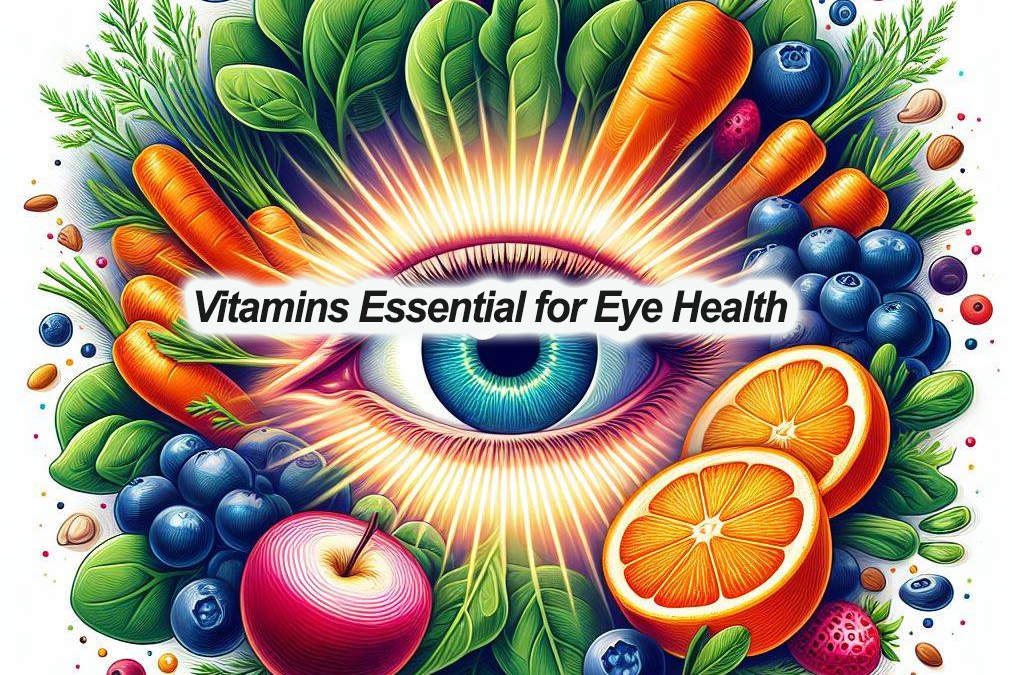Maintaining good eye health is essential for overall well-being, and certain vitamins play a crucial role in supporting vision and preventing eye-related conditions. Here are the vitamins necessary for healthy eyes:
1. Vitamin A
Vitamin A is vital for maintaining proper vision, particularly in low-light conditions. It helps produce a pigment called rhodopsin in the retina, which is essential for night vision. Vitamin A also supports the health of the cornea and other eye tissues.
2. Vitamin C
Vitamin C is a powerful antioxidant that helps protect the eyes from oxidative stress caused by free radicals. It supports the health of blood vessels in the eyes and may reduce the risk of cataracts and age-related macular degeneration (AMD).
3. Vitamin E
Like vitamin C, vitamin E is an antioxidant that helps protect cells from damage. It may help reduce the risk of cataracts and AMD by neutralizing free radicals that can harm eye tissues.
4. Vitamin D
Vitamin D plays a role in reducing inflammation and may help protect against certain eye conditions, including AMD. Additionally, vitamin D deficiency has been linked to an increased risk of dry eye syndrome.
5. Vitamin B Complex
Several B vitamins are essential for eye health, including:
- Vitamin B6: Helps reduce the risk of inflammation in the eyes and may prevent AMD.
- Vitamin B9 (Folate): Supports healthy blood flow to the eyes and may reduce the risk of AMD.
- Vitamin B12: Deficiency in vitamin B12 has been linked to optic neuropathy and other eye disorders.
6. Omega-3 Fatty Acids
Omega-3 fatty acids, particularly EPA and DHA, are important for maintaining the health of the retina. They help reduce inflammation and may lower the risk of AMD and dry eye syndrome.
7. Lutein and Zeaxanthin
Lutein and zeaxanthin are carotenoids that act as antioxidants in the eyes. They help filter harmful blue light and protect the retina from damage. Lutein and zeaxanthin are especially concentrated in the macula, the central part of the retina responsible for detailed vision.
8. Zinc
Zinc is a mineral that plays a role in the metabolism of vitamin A and helps maintain the health of the retina. It may also reduce the risk of AMD and contribute to the healing of eye injuries.
9. Copper
Copper is necessary for the formation of melanin, a pigment that helps protect the eyes from UV radiation. It also plays a role in maintaining the health of the optic nerve.
10. Selenium
Selenium is an antioxidant that helps protect the eyes from oxidative damage. It may reduce the risk of cataracts and other age-related eye disorders.
A diet rich in vitamins A, C, E, B-complex vitamins, omega-3 fatty acids, and minerals like zinc, copper, and selenium can help support eye health and reduce the risk of various eye conditions. Including a variety of nutrient-rich foods in your diet or taking supplements as needed can ensure you get the vitamins and minerals necessary for optimal eye health. However, it’s essential to consult with a healthcare professional before starting any new supplements. Regular eye exams are also crucial for detecting any issues early and maintaining good vision throughout life.

